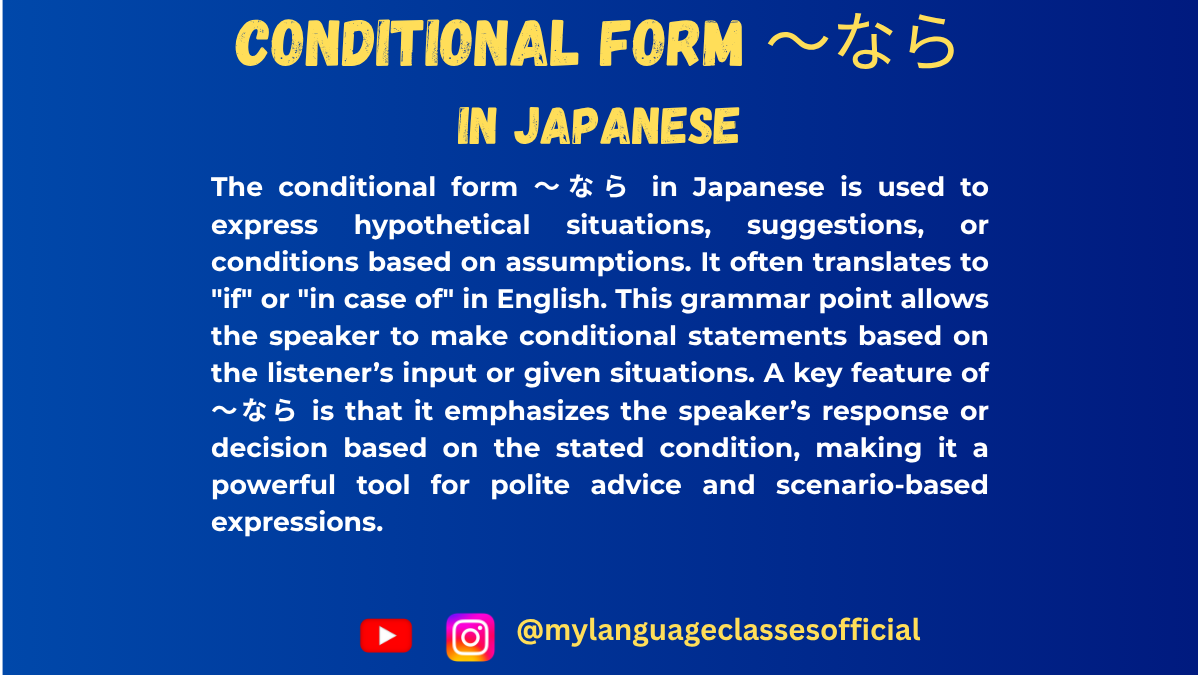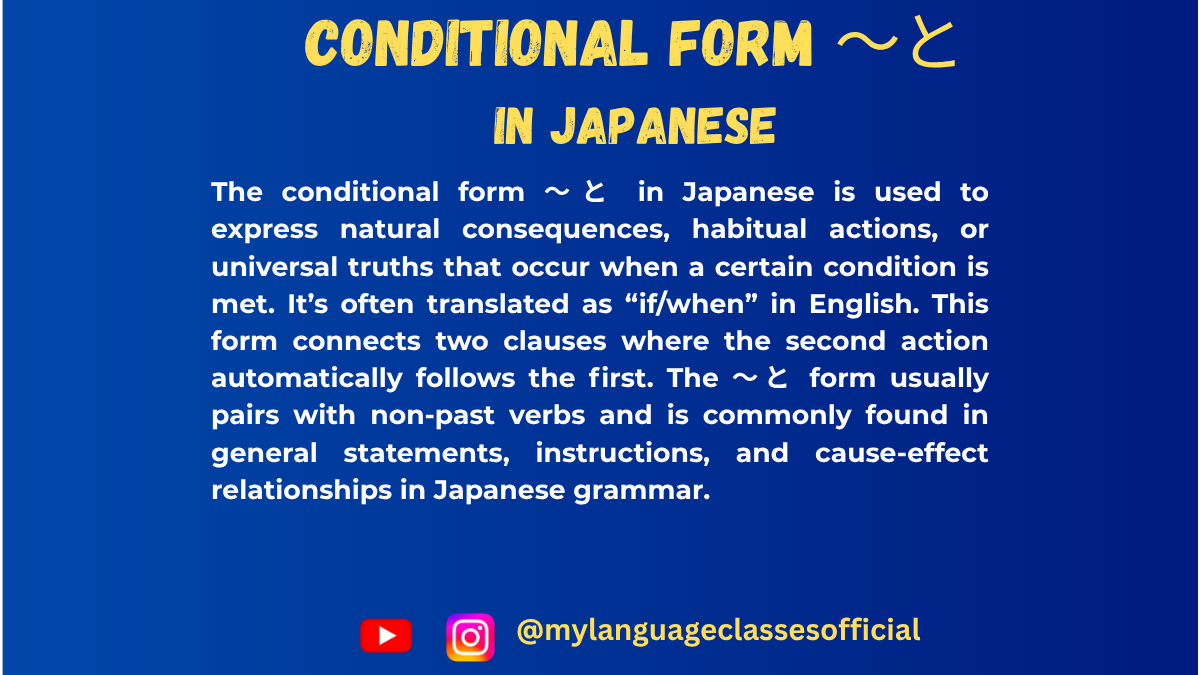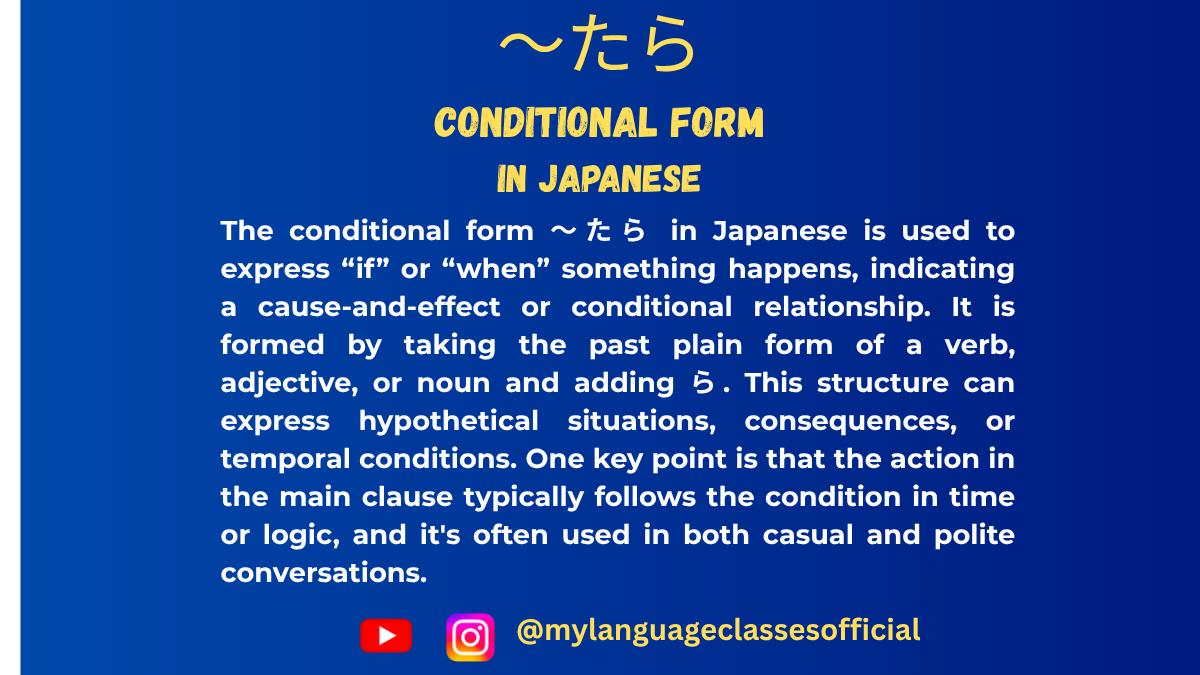Your cart is currently empty!
Tag: JLPT N4 grammar
-

Using 〜なら for hypothetical situations | My Language Classes
〜なら: Expressing “If” or “As for” in Japanese
In Japanese, 〜なら is a versatile grammar structure often used to express conditionality (“if”) or to provide contextual emphasis (“as for”). This blog post will explore its usage in various contexts and provide a comprehensive list of situations where 〜なら is applicable.
What is 〜なら?
The particle なら is derived from the verb 成る (なる), which means “to become.” In grammar, it functions as a conditional marker or a topic-related particle depending on the context. It is commonly attached to the plain form of verbs, nouns, or adjectives.
Usage of 〜なら
1. Conditional “If”
- Meaning: Expresses a hypothetical or conditional situation.
- Structure:
Clause A (plain form) + なら, Clause B
Clause B often represents the speaker’s judgment, advice, or consequence.
Examples:
- 日本に行くなら、富士山を見たほうがいいですよ。
(Nihon ni iku nara, Fujisan o mita hō ga ii desu yo.)
If you’re going to Japan, you should see Mt. Fuji. - 雨が降るなら、外出しないほうがいいです。
(Ame ga furu nara, gaishutsu shinai hō ga ii desu.)
If it rains, you shouldn’t go out.
2. Topic-Based “As for”
- Meaning: Indicates that a specific topic is being addressed in response to a preceding statement or question.
- Structure:
Noun + なら
Examples:
- 映画なら、コメディが一番好きです。
(Eiga nara, komedi ga ichiban suki desu.)
As for movies, I like comedies the best. - この本なら、もう読んだことがあります。
(Kono hon nara, mō yonda koto ga arimasu.)
As for this book, I’ve already read it.
3. Contrasting Ideas
- Meaning: Suggests a contrast between two different ideas or topics.
- Structure:
Noun/Adjective/Verb + なら
Examples:
- 英語なら話せますが、フランス語は話せません。
(Eigo nara hanasemasu ga, Furansugo wa hanasemasen.)
If it’s English, I can speak it, but I can’t speak French. - 安いなら買いますが、高いなら買いません。
(Yasui nara kaimasu ga, takai nara kaimasen.)
If it’s cheap, I’ll buy it, but if it’s expensive, I won’t.
4. Hypothetical Suggestions
- Meaning: Used when giving suggestions or advice based on hypothetical conditions.
- Structure:
Clause + なら
Examples:
- 東京に行くなら、スカイツリーを訪れるべきです。
(Tōkyō ni iku nara, Sukaitsurī o otozureru beki desu.)
If you’re visiting Tokyo, you should check out the Skytree. - 勉強するなら、早めに始めたほうがいいですよ。
(Benkyō suru nara, hayame ni hajimeta hō ga ii desu yo.)
If you’re going to study, it’s better to start early.
5. Clarifications or Conditions
- Meaning: Used when responding to a condition or clarifying information.
- Structure:
Noun + なら
Examples:
- 山田さんなら、もう帰りましたよ。
(Yamada-san nara, mō kaerimashita yo.)
If you’re talking about Yamada-san, he’s already gone home. - 駅なら、この道をまっすぐ行けば着きます。
(Eki nara, kono michi o massugu ikeba tsukimasu.)
If you mean the station, go straight down this road.
When to Use 〜なら?
Here is a quick checklist of situations where 〜なら is appropriate:
- Making a Hypothetical Conditional Statement:
“If you’re going to X, then Y.” - Responding to Questions or Comments with Context:
“As for X, Y applies.” - Contrasting Two Scenarios or Topics:
“If X is true, Y. But if not, Z.” - Providing Advice Based on Hypothetical Situations:
“If you’re considering X, then Y is a good idea.” - Clarifying or Confirming a Specific Topic:
“If you’re talking about X, then Y.”
Tips for Using 〜なら
- Be Contextual: 〜なら thrives on context. Make sure the listener understands the implied condition or topic.
- Be Specific: Use it to address clear contrasts or hypothetical situations, avoiding vague statements.
- Practice Intonation: When using 〜なら in spoken Japanese, emphasize the conditional tone to make your intent clear.
By mastering 〜なら, you’ll find yourself able to express conditions, offer advice, and clarify topics more effectively in Japanese. Practice by creating your own sentences in real-life scenarios!
If you enjoyed this lesson, be sure to check out more posts like this on my blog at My Language Classes. Don’t forget to subscribe my YouTube channel and follow me on Instagram for the latest language learning tips and lessons. Leave a comment below to share your thoughts, or ask any questions you have about nouns.
Happy learning! 😊
-

Using 〜と for Natural Consequence | My Language Classes
Expressing a Natural Consequence in Japanese: 〜と
In Japanese, the particle 〜と has a variety of usages, but it is commonly employed to express natural consequences, conditions, or outcomes. Understanding 〜と is essential for mastering conditional sentences and making logical connections between actions or states.
This blog post will explore the various situations where 〜と is used, providing detailed explanations and examples to help you grasp its nuances.
Primary Uses of 〜と
- Expressing a Natural or Inevitable Consequence When 〜と is used, it implies that the result is a natural or automatic outcome of the preceding action or condition. This is particularly common in scientific or logical statements.Structure:
- Clause A と Clause B
(When Clause A happens, Clause B naturally follows.)
- ボタンを押すと、ドアが開きます。
(When you press the button, the door opens.) - 冬になると、雪が降ります。
(When it becomes winter, it snows.)
- Clause A と Clause B
- Habitual Actions or Repeated Outcomes
〜と can describe a habitual action or repeated phenomenon triggered by a condition.Examples:- 朝起きると、コーヒーを飲みます。
(When I wake up in the morning, I drink coffee.) - 毎回この歌を聞くと、昔を思い出します。
(Every time I hear this song, I remember the past.)
- 朝起きると、コーヒーを飲みます。
- Discoveries or Unexpected Realizations
〜と is used to describe a situation where the speaker discovers something upon performing an action.Examples:- ドアを開けると、猫がいました。
(When I opened the door, there was a cat.) - 山の頂上に着くと、美しい景色が広がっていました。
(When I reached the mountain summit, a beautiful view spread out before me.)
- ドアを開けると、猫がいました。
- Warnings and Hypothetical Negative Outcomes
〜と can express a warning or a negative consequence if a certain action is performed.Examples:- 急がないと、電車に乗り遅れますよ。
(If you don’t hurry, you’ll miss the train.) - そんなことをすると、後で後悔しますよ。
(If you do such a thing, you’ll regret it later.)
- 急がないと、電車に乗り遅れますよ。
- Instructions or Rules in Conditional Situations
In formal contexts, 〜と is used to convey instructions, rules, or expected outcomes.Examples:- お金を入れると、商品が出てきます。
(When you insert money, the product comes out.) - このボタンを押すと、エンジンがスタートします。
(When you press this button, the engine starts.)
- お金を入れると、商品が出てきます。
Key Differences Between 〜と and Other Conditional Particles
- 〜と vs 〜ば
While both can describe conditions, 〜ば focuses more on hypothetical or general conditions, whereas 〜と emphasizes a natural or inevitable result.
Example:- 〜と: 雨が降ると、道が濡れます。
(When it rains, the roads get wet.) - 〜ば: 雨が降れば、試合は中止になるでしょう。
(If it rains, the match will likely be canceled.)
- 〜と: 雨が降ると、道が濡れます。
- 〜と vs 〜たら
〜たら is often used for one-time conditions or events and can handle past-tense conditions, unlike 〜と.
Example:- 〜と: 春になると、桜が咲きます。
(When it becomes spring, cherry blossoms bloom.) - 〜たら: 春になったら、旅行に行きたいです。
(When it becomes spring, I want to travel.)
- 〜と: 春になると、桜が咲きます。
List of Situations Where 〜と Is Used
- Natural or inevitable consequences.
- Habitual actions or consistent outcomes.
- Discoveries or unexpected realizations.
- Warnings or hypothetical negative outcomes.
- Instructions, rules, or predictable results in formal contexts.
Points to Remember About 〜と
- Non-Intentional Clause B:
The second clause (Clause B) must describe something out of the speaker’s control, such as a fact, habitual action, or natural consequence. - No Past-Tense Clause A:
The first clause (Clause A) cannot be in the past tense.
Example:- Incorrect: 彼が来たと、部屋が明るくなった。
- Correct: 彼が来ると、部屋が明るくなった。
(When he comes, the room becomes brighter.)
- Clear Cause-and-Effect Relationship:
There must be a logical and automatic relationship between Clause A and Clause B.
Mastering 〜と will enhance your ability to create logical, fluent sentences in Japanese. By understanding its nuances and contexts, you’ll find it easier to express cause-and-effect relationships and describe habitual or natural outcomes in daily conversation and writing.
If you enjoyed this lesson, be sure to check out more posts like this on my blog at My Language Classes. Don’t forget to subscribe my YouTube channel and follow me on Instagram for the latest language learning tips and lessons. Leave a comment below to share your thoughts, or ask any questions you have about nouns.
Happy learning! 😊
- Expressing a Natural or Inevitable Consequence When 〜と is used, it implies that the result is a natural or automatic outcome of the preceding action or condition. This is particularly common in scientific or logical statements.Structure:
-

Understanding 〜たら (If/When) | My Language Classes
Understanding the Conditional “If” or “When” in Japanese
Japanese is a beautifully nuanced language, and understanding its conditional expressions is essential to mastering its grammar. Among these, 〜たら is one of the most versatile and commonly used forms to express conditionality. While it often translates to “if” or “when” in English, its usage varies depending on context. In this blog post, we’ll dive into everything you need to know about 〜たら, including its formation, usage, and specific examples for different scenarios.
What is 〜たら?
The term 〜たら comes from the た-form of verbs, adjectives, or copulas, combined with the particle ら. This construction is used to describe a condition that must be met for the second clause to occur. Its meaning can vary depending on the time and certainty implied in the context.
Formation:
- Verbs:
Base verb (た-form) + ら
Example: 食べる (to eat) → 食べたら (if/when [you] eat) - Adjectives (い-adjectives):
Drop the い, add かった, then add ら.
Example: 楽しい (fun) → 楽しかったら (if/when [it’s] fun) - Adjectives (な-adjectives) & Nouns:
Add だったら after the base word.
Example: 静か (quiet) → 静かだったら (if/when [it’s] quiet)
学生 (student) → 学生だったら (if/when [you’re] a student)
When to Use 〜たら
〜たら is used in a variety of scenarios, and understanding the context is key to choosing the right conditional expression in Japanese. Below are the primary uses of 〜たら with examples.
1. Hypothetical Conditions (“If”)
When describing a situation that may or may not happen, 〜たら acts like “if” in English.
- Example:
雨が降ったら、家にいます。
(If it rains, I’ll stay home.)
2. Temporal Conditions (“When”)
〜たら can indicate “when” for an action that will happen after the condition is met.
- Example:
宿題が終わったら、遊びに行きましょう。
(When you finish your homework, let’s go play.)
3. Unrealistic or Imaginary Conditions
When discussing hypothetical scenarios that are unlikely or purely imaginary, 〜たら is the go-to form.
- Example:
お金持ちだったら、世界中を旅行したい。
(If I were rich, I would like to travel the world.)
4. Unexpected Results
In some cases, the action in the second clause is surprising or contrary to what was expected from the condition in the first clause.
- Example:
ドアを開けたら、猫がいました。
(When I opened the door, there was a cat.)
[Note: The speaker didn’t expect a cat to be there.]
5. Past Actions Followed by Realization
〜たら is also used when an action is completed, and the speaker realizes or learns something new afterward.
- Example:
その映画を見たら、泣いてしまった。
(When I watched that movie, I ended up crying.)
6. Conditional Advice or Suggestions
To offer advice or make suggestions contingent on a condition.
- Example:
疲れたら、休んだほうがいいですよ。
(If you’re tired, you should take a rest.)
List of Situations Where 〜たら is Used
Here’s a concise list of common situations where 〜たら appears:
- Hypothetical conditions: Speculating about what might happen.
- Temporal conditions: Actions that occur sequentially.
- Unrealistic conditions: Hypothetical scenarios (e.g., dreams or fantasies).
- Surprising or unexpected outcomes: Actions that yield unforeseen results.
- Post-event realization: Discoveries made after completing an action.
- Giving advice or suggestions: Contingent recommendations.
- Plans based on conditions: Situations where future actions depend on prior conditions.
How is 〜たら Different from Other Conditionals?
Japanese has several conditional forms, such as と, ば, and なら, which can sometimes overlap in meaning. Here’s how 〜たら compares:
- 〜たら is versatile and works for past, present, and future conditions, as well as hypothetical and temporal situations.
- と emphasizes natural consequences or inevitable results (e.g., “If you press this button, the door will open”).
- ば is more formal and focuses on hypothetical or logical outcomes.
- なら introduces a topic or focuses on conditions assumed to be true (e.g., “If it’s about Tokyo, I know a lot”).
Practice Makes Perfect!
To truly master 〜たら, practice creating sentences for various scenarios. Start with simple sentences like:
- 雨が降ったら、どうしますか?
(If it rains, what will you do?)
Then, challenge yourself with complex structures:
- この本を読んだら、新しい考え方が学べると思います。
(I think if you read this book, you’ll learn a new way of thinking.)
Conclusion
Understanding 〜たら is essential for fluency in Japanese. Its flexibility allows it to cover a range of situations, from hypothetical scenarios to real-life sequential actions. By practicing its usage and comparing it to other conditionals, you’ll be able to express yourself naturally and accurately in Japanese. Remember, context is everything, so keep practicing, and soon enough, using 〜たら will feel as natural as saying “if” or “when” in English!
If you enjoyed this lesson, be sure to check out more posts like this on my blog at My Language Classes. Don’t forget to subscribe my YouTube channel and follow me on Instagram for the latest language learning tips and lessons. Leave a comment below to share your thoughts, or ask any questions you have about nouns.
Happy learning! 😊
- Verbs:
